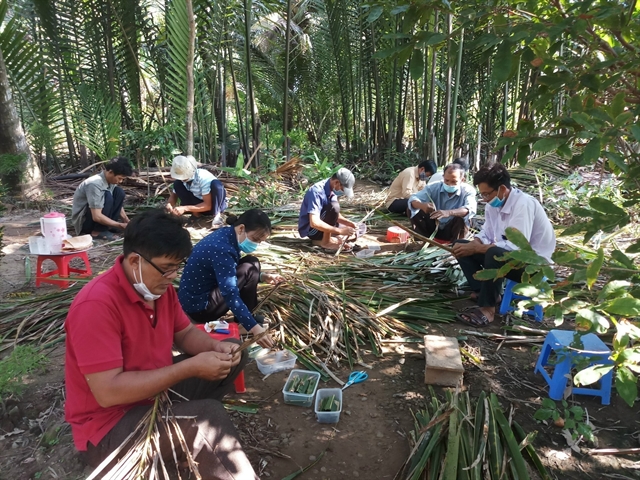 Society
Society

 |
| Farmers are instructed on methods of breeding ong kí sinh in Bến Tre Province. – VNA/VNS Photo Huỳnh Phúc Hậu |
BẾN TRE — The Cửu Long (Mekong) Delta province of Bến Tre is encouraging farmers to breed ong kí sinh (Brachymeria sp), a parasitic wasp, to control coconut black-headed caterpillars in coconut groves.
In July 2020, the pest appeared for the first time in Bình Đại District’s Phú Long Commune in the country’s largest coconut-growing province.
The caterpillar eats leaves and the husk of immature coconuts, causing damage to fruit and reducing yields.
It has damaged coconut groves in other countries such as India, Sri Lanka and Thailand.
Huỳnh Quang Đức, deputy director of the provincial Department of Agriculture and Rural Development, said the department is instructing farmers to expand breeding and releasing of the parasitic wasp in coconut groves to control the spread of the pest and recover affected groves.
To destroy the pest and mitigate adverse impacts to the environment, the province tries to use natural measures rather than pesticides, and the breeding and releasing of the parasitic wasp is the most effective measure, he said.
The wasp acts as a biological agent to control the caterpillar.
The caterpillar has infected more than 1,100ha of coconut in the province so far, 448ha of which have been recovered, according to the department.
The department has encouraged farmers to participate in groups to breed the wasp and release them in coconut groves to protect the groves when the pest attacks coconut trees.
The province has released more than 30 million ong kí sinh which are bred in local labs and plant protection stations of Mỏ Cày Bắc, Mỏ Cày Nam, Giồng Trôm and Châu Thành districts.
The districts have transferred techniques of breeding ong kí sinh to farmers.
The province plans to breed and release an additional 25 million ong kí sinh in affected groves from now to year end.
It is monitoring new affected groves to properly take integrated management measures to control the pest.
It has encouraged farmers to switch from using chemical pesticides to using biological ones to control the pest.
Võ Văn Nam, head of the province’s Plant Cultivation and Protection Sub-department, said the sub-department in co-operation with the HCM City University of Agriculture and Forestry has established various models of releasing ong kí sinh in affected groves.
Most of the affected groves have been recovered, he said.
Bến Tre has more than 72,000ha of coconut, accounting for more than 42 per cent of the country’s total area. – VNS

.jpg)


